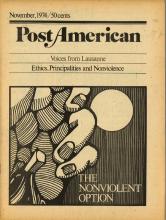With deep regret, I, as a black participant of the International Congress on World Evangelization, feel that I cannot sign the Covenant. Inasmuch as I have a great deal of respect for the few leaders that I know personally, I shall share the reasons for my decision.
In a nutshell,
There were signs at
We affirm that God is both Creator and Judge of all men. We therefore should share His concern for justice and reconciliation throughout human society and for the liberation of men from every kind of oppression…. We affirm that evangelism and socio-political involvement are both a part of our Christian Duty. For both are necessary expressions of our doctrine of God and man, our love for our neighbor, and our obedience to Jesus Christ. The message of salvation implies also a message of judgment upon every form of alienation, oppression, and discrimination…. When people receive Christ they are born again into His kingdom and must seek not only to exhibit, but also to spread its righteousness in the midst of an unrighteous world. The salvation we claim should be transforming us in the totality of our personal and social responsibilities. Faith without works is dead.
Read the Full Article

